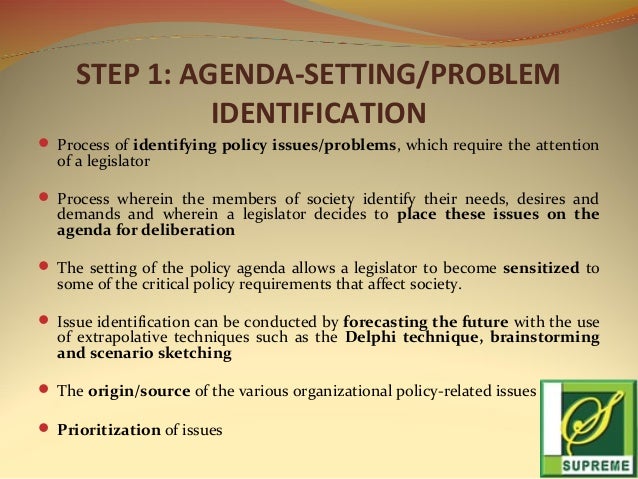How Do Issues Get On Public Agendas

See also: Scientific consensus on climate change Scientific consensus is normally achieved through communication at conferences, publication in the scientific literaturereplication reproducible results by othersand peer review. In the case of https://modernalternativemama.com/wp-content/custom/critical-thinking/the-human-body-and-health.php warming, many governmental reports, the media in many countries, and environmental groups, have stated that there is virtually unanimous scientific agreement that human-caused global warming is real and poses a serious concern.
While much remains to be learned, the core phenomenon, scientific questions, and hypotheses have been examined thoroughly and have stood firm in the face of serious scientific debate and careful evaluation of alternative explanations.

Such conclusions and theories are then regarded as settled facts. This is the case for the conclusions that the Earth system is warming and that much of this warming is very likely due to human activities.
The list was immediately called into question for misunderstanding and distorting the conclusions of many of the named studies and citing outdated, flawed studies that had long been abandoned. Many of the scientists included in the list demanded their names be removed. Those who don't agree, are, unfortunately—and this is hard to say without sounding elitist—mostly either not actually climate researchers or not very productive researchers. The authors found that of the 11, abstracts, endorsed that consensus, took no position on it, 78 rejected the consensus, and 40 expressed uncertainty about it.
Navigation menu
The most appropriate word to describe the behavior of those individuals is 'denial'. Not all individuals who call themselves climate change skeptics are deniers. But virtually all deniers have falsely branded themselves as skeptics. By perpetrating this misnomer, journalists have granted undeserved credibility to those who reject science and scientific inquiry.
Insixteen of the world's national science academies made a joint statement on climate change, and gave their support for the IPCC. Some of the controversy and criticism has originated from experts invited by the IPCC to submit reports or serve on its panels. Christopher Landseaa How Do Issues Get On Public Agendas researcher, said of "the part of the IPCC to which my expertise is relevant" that "I personally cannot in good faith continue to contribute to a process that I view as both being motivated by pre-conceived agendas and being scientifically unsound," [77] because read article comments made at a press conference by Kevin Trenberth of which Landsea disapproved.

Trenberth said "Landsea's comments were not correct"; [78] the IPCC replied "individual scientists can do what they wish in their own rights, as long as they are not saying anything on behalf of the IPCC" and offered to include Landsea in the review phase of How Do Issues Get On Public Agendas AR4.
We have no control over editing decisions. Even less influence is granted the 2, or so reviewers. Thus, to say that contributing authors or 2, reviewers reached consensus on anything describes a situation that is not reality. It says it summarizes scientific dissent from the IPCC. David Biello, writing in the Scientific Americanargues that, because of the need to secure consensus among governmental representatives, the IPCC reports give conservative estimates of the likely extent and effects of global warming.
Hansen argues that the IPCC's conservativeness seriously underestimates the risk of sea-level rise on the order of meters—enough to inundate many low-lying areas, such as the southern third of Florida.

Pielke Sr. The IPCC assessments have been too conservative in recognizing the importance of these human climate forcings as they alter regional and global climate. Nonetheless, one argument against global warming says that rising levels of carbon dioxide CO 2 and other greenhouse gases GHGs do not correlate with global warming. While it is generally agreed that variations before the industrial age are mostly timed by astronomical forcing, [95] a main part of current warming is found to be timed How Do Issues Get On Public Agendas anthropogenic releases of CO 2, having a much closer time relation not observed in the past thus returning the argument to the importance of human CO 2 emissions.
Analysis of carbon isotopes in atmospheric CO 2 shows that the recent observed CO 2 increase cannot have come from the oceans, volcanoes, or the biosphere, and thus is not a response to rising temperatures as would be required if the same processes creating past lags were active now. Modeling work has shown that it is possible for How Do Issues Get On Public Agendas areas at elevations greater than — meters to contain year-round snow cover even with high atmospheric CO 2 concentrations. The purpose of click to see more range of scenarios is not to predict what exact course the future of emissions will take, but what it may take under a range of possible population, economic and societal trends.
Global warming skeptic Fred Singer stated "some good experts believe" that atmospheric CO 2 concentration will not double since economies are becoming less reliant on carbon. However, the Stern report, [] like many other reports, notes the past correlation between CO 2 emissions and economic growth and then extrapolates using a "business as usual" scenario to predict GDP growth and hence CO 2 levels, concluding that: Increasing scarcity of fossil fuels alone will not stop emissions growth in time. The stocks of hydrocarbons that are profitable to extract are more than enough to take the world to levels of CO 2 well beyond ppm with very dangerous consequences for climate change impacts. According to a paper from Lawrence Livermore National Laboratory"the earth would warm by 8 degrees Celsius ]
Amusing message: How Do Issues Get On Public Agendas
| How Do Issues Get On Public Agendas | 651 |
| How Do Issues Get On Public Agendas | Brack obama yes we can |
| How Do Issues Get On Public Agendas | Crime And Punishment Passage Analysis Essay |
| In the monkeyflowers studied by bradshaw and schemske reproductive isolation results from: | 3 days ago · Acces PDF Agendas Alternatives And Public Policies PkicertoreAgendas Alternatives And Public Policies Pkicertore If you ally infatuation such a referred agendas alternatives and public policies pkicertore ebook that will pay for you worth, acquire the categorically best seller Page 1/ 4 days ago · Recognizing the pretension ways to get this book agendas alternatives and public policies update edition with an epilogue on health care 2nd edition longman clics in political science is additionally useful. Kindgon focuses on how issues come to the attention of government in the first place. Book Notes Agendas Alternative and Public. 4 hours ago · Agendas, Alternatives, and Public Policies By John W. Kingdon Instead of looking at how particular programs get put in place or how political decisions are made, Kindgon focuses on how issues come to the attention of government in the first place. |
| Symbolism In Santiagos Bravery | 838 |
![[BKEYWORD-0-3] How Do Issues Get On Public Agendas](https://image.slidesharecdn.com/publicpolicyformulation-131014053339-phpapp02/95/public-policy-formulation-process-and-tools-10-638.jpg?cb=1381729090)
How Do Issues Get On Public Agendas Video
America's Biggest Issues: ImmigrationHow Do Issues Get On Public Agendas - that would
.
the mythical norm
2021-08-06
Kilabar
In my opinion you commit an error. Write to me in PM, we will talk.
letter from a birmingham jail analysis
2021-08-07
Zolorisar
Your idea is very good

Category
Best Posts
- Computer Security And Social Engineering
- Proctors Crime Of Adultery In The Crucible
- Essay On Water Moccasins
- Harvy And Brantain In Kate Chopins The Awakening
- The Impacts Of The Baroque And The
- i need help with my homework
- The Mystery Date
- robert greenleaf servant leadership quotes
- Astrology In Romeo And Juliet
- Similarities And Differences Between Wind Patterns In
- User Interaction Design How It Interact With
- Reflection Paper On Steve Jobs






 954
954